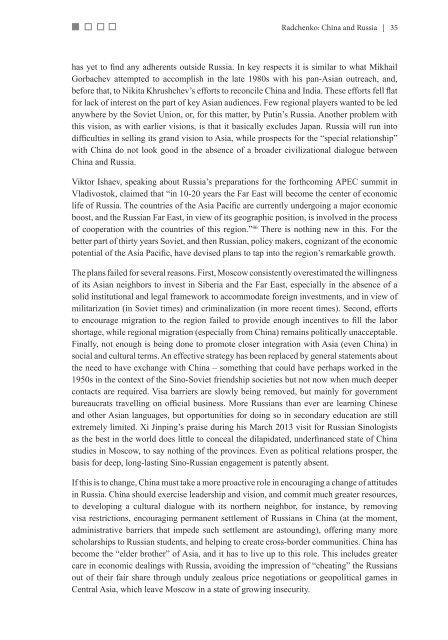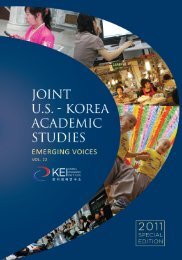the full publication PDF - Korea Economic Institute
the full publication PDF - Korea Economic Institute
the full publication PDF - Korea Economic Institute
Create successful ePaper yourself
Turn your PDF publications into a flip-book with our unique Google optimized e-Paper software.
Radchenko: China and Russia | 35<br />
has yet to find any adherents outside Russia. In key respects it is similar to what Mikhail<br />
Gorbachev attempted to accomplish in <strong>the</strong> late 1980s with his pan-Asian outreach, and,<br />
before that, to Nikita Khrushchev’s efforts to reconcile China and India. These efforts fell flat<br />
for lack of interest on <strong>the</strong> part of key Asian audiences. Few regional players wanted to be led<br />
anywhere by <strong>the</strong> Soviet Union, or, for this matter, by Putin’s Russia. Ano<strong>the</strong>r problem with<br />
this vision, as with earlier visions, is that it basically excludes Japan. Russia will run into<br />
difficulties in selling its grand vision to Asia, while prospects for <strong>the</strong> “special relationship”<br />
with China do not look good in <strong>the</strong> absence of a broader civilizational dialogue between<br />
China and Russia.<br />
Viktor Ishaev, speaking about Russia’s preparations for <strong>the</strong> forthcoming APEC summit in<br />
Vladivostok, claimed that “in 10-20 years <strong>the</strong> Far East will become <strong>the</strong> center of economic<br />
life of Russia. The countries of <strong>the</strong> Asia Pacific are currently undergoing a major economic<br />
boost, and <strong>the</strong> Russian Far East, in view of its geographic position, is involved in <strong>the</strong> process<br />
of cooperation with <strong>the</strong> countries of this region.” 46 There is nothing new in this. For <strong>the</strong><br />
better part of thirty years Soviet, and <strong>the</strong>n Russian, policy makers, cognizant of <strong>the</strong> economic<br />
potential of <strong>the</strong> Asia Pacific, have devised plans to tap into <strong>the</strong> region’s remarkable growth.<br />
The plans failed for several reasons. First, Moscow consistently overestimated <strong>the</strong> willingness<br />
of its Asian neighbors to invest in Siberia and <strong>the</strong> Far East, especially in <strong>the</strong> absence of a<br />
solid institutional and legal framework to accommodate foreign investments, and in view of<br />
militarization (in Soviet times) and criminalization (in more recent times). Second, efforts<br />
to encourage migration to <strong>the</strong> region failed to provide enough incentives to fill <strong>the</strong> labor<br />
shortage, while regional migration (especially from China) remains politically unacceptable.<br />
Finally, not enough is being done to promote closer integration with Asia (even China) in<br />
social and cultural terms. An effective strategy has been replaced by general statements about<br />
<strong>the</strong> need to have exchange with China – something that could have perhaps worked in <strong>the</strong><br />
1950s in <strong>the</strong> context of <strong>the</strong> Sino-Soviet friendship societies but not now when much deeper<br />
contacts are required. Visa barriers are slowly being removed, but mainly for government<br />
bureaucrats travelling on official business. More Russians than ever are learning Chinese<br />
and o<strong>the</strong>r Asian languages, but opportunities for doing so in secondary education are still<br />
extremely limited. Xi Jinping’s praise during his March 2013 visit for Russian Sinologists<br />
as <strong>the</strong> best in <strong>the</strong> world does little to conceal <strong>the</strong> dilapidated, underfinanced state of China<br />
studies in Moscow, to say nothing of <strong>the</strong> provinces. Even as political relations prosper, <strong>the</strong><br />
basis for deep, long-lasting Sino-Russian engagement is patently absent.<br />
If this is to change, China must take a more proactive role in encouraging a change of attitudes<br />
in Russia. China should exercise leadership and vision, and commit much greater resources,<br />
to developing a cultural dialogue with its nor<strong>the</strong>rn neighbor, for instance, by removing<br />
visa restrictions, encouraging permanent settlement of Russians in China (at <strong>the</strong> moment,<br />
administrative barriers that impede such settlement are astounding), offering many more<br />
scholarships to Russian students, and helping to create cross-border communities. China has<br />
become <strong>the</strong> “elder bro<strong>the</strong>r” of Asia, and it has to live up to this role. This includes greater<br />
care in economic dealings with Russia, avoiding <strong>the</strong> impression of “cheating” <strong>the</strong> Russians<br />
out of <strong>the</strong>ir fair share through unduly zealous price negotiations or geopolitical games in<br />
Central Asia, which leave Moscow in a state of growing insecurity.










